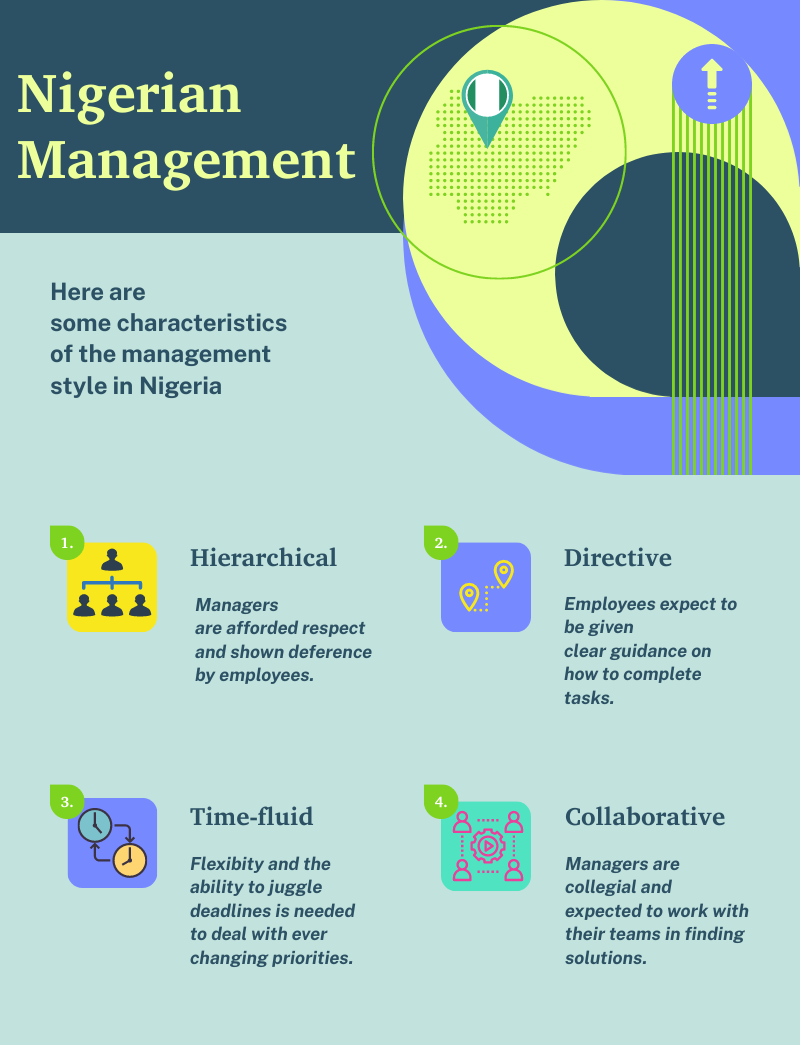
Cross Cultural Management Guide for Nigeria
The guidance offered below is for managers who want to learn more about the management style and business culture of Nigeria.
It provides some useful information for managers who are relocating to the country for employment as well as those who may have Nigerian employees in their global or multicultural teams.
Topics include:
- Hierarchy
- Leadership style
- Time and priorities
- Communication style
- Negotiations
Being a Manager in Nigeria
The business culture in Nigeria is on the more formal side. Managers tend to adopt an official demeanour and expect deference to be shown to those in positions of power or age and rank.
- Nigerians believe that life seasons people, and that they learn from their various experiences.
- They may bow to an older person or someone who is in authority.
- They never publicly disagree with someone who is older or more senior than themselves. It is a good idea to emulate this behaviour.
- Since the business culture relies on personal relationships, expect businesspeople to devote a great deal of time and attention to getting-to-know-you conversations.
- Rushing small talk is viewed as an insult and patience will be a necessary attribute.
- The Nigerian business style adheres to many British protocols.
- Avoid "hard sell" techniques and maintain a courteous demeanour at all times.
- At the same time, there is an entrenched bureaucracy and a great deal of government red tape.
The Role of a Manager
Foreign managers will be more effective if they bear in mind that each person has a very distinct role within the organization, and maintaining that role helps to keep order.
- In Nigeria, as in other hierarchical societies, managers may take a somewhat paternalistic attitude toward their employees.
- They may demonstrate a concern for employees that goes beyond the workplace and strictly professional concerns.
Approach to Change
According to intercultural studies, Nigeria has a medium tolerance for risk. People accept change, albeit slowly, and require a considerable amount of thought, planning and time.
- It would be perceived as imprudent to introduce rapid change, and yet it would be recognized as poor management to resist change unnecessarily.
- Tradition is valued, thus change is not readily embraced simply because it is new.
- The fear of exposure, and the potential embarrassment that may accompany failure, bring about an aversion to risk.
- Because of this attitude, cultural sensitivity is going to be required, especially when conducting group meetings and discussing contributions made by participating individuals.

Time and Priorities
Deadlines and timescales are fluid in Nigeria. Patience will play an essential part in successful management.
- While timescales and deadlines need to be set well in advance and reiterated carefully, it should be understood that these will be viewed as flexible.
- Global working means that some managers may have a greater appreciation of the need to enforce timescales and as such, agreed deadlines are more likely to be met.
Decision Making
Business is hierarchical and employees are expected to show proper deference and respect towards those in superior positions.
- Managers do not seek a consensus before making decisions.
- For the most part, Nigerians can be strict managers. They are openly critical of employees and their performance.
- They do not expect their staff to demonstrate initiative, originality, or independent thinking.
- There is little delegation of authority.
- Managers give their staff explicit instructions and expect them to follow the instructions to the letter.
Boss or Team Player?
Nigerians, on the whole, like working in teams and collaborate well across hierarchical lines.
- Communication within a team is generally quite collegial, albeit somewhat direct and blunt.
- A successful manager will harness the talent of the group assembled, and develop any resulting synergies.
Communication and Negotiation Styles
Good personal relationships are important since trust is required in order to conduct business.
- Since age is considered indicative of wisdom, include older businesspeople on your negotiating team.
- Wait to be told where to sit. Status often dictates a seating plan.
- Companies are hierarchical. Ultimate decision-making often rests with the CEO.
- Decisions are reached slowly. If you attempt to rush the process, you will give offence and risk your business relationship.
- Getting decisions from government officials can be extremely protracted.
- Nigerians can be tough bargainers. They will state their position clearly and may get into heated discussions.
- You will be expected to honour any promise you make.
- The initial agreement is generally verbal, which is then followed up with a contract.
- For the most part, Nigerians expect flexibility in working out the details.

Get Expert Management Training
To ensure your success when working with Nigerians, sign up for some hands-on training and support from an expert.
You can have your own customised two-hour live webinar with one of our Nigeria management team.

 +44 0330 027 0207 or +1 (818) 532-6908
+44 0330 027 0207 or +1 (818) 532-6908

